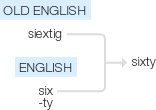Sixty
Old English siextig (see six, -ty2).
wiktionary
From Middle English sixty, sexty, Old English siextiġ, from Proto-Germanic *sehs tigiwiz(“sixty”), equivalent to six + -ty. Cognate with Scots sexty, saxty(“sixty”), Saterland Frisian säkstich(“sixty”), West Frisian sechstich(“sixty”), Dutch zestig(“sixty”), German Low German sesstig(“sixty”), German sechzig(“sixty”), Swedish sextio(“sixty”), Norwegian seksti(“sixty”), Icelandic sextíu(“sixty”). Compare also Sanskrit षष्टि(ṣaṣṭi).
etymonline
sixty (adj., n.)
"1 more than fifty-nine, twice thirty; the number which is one more than fifty-nine; a symbol representing this number;" Old English sixtig, from siex (see six) + -tig (see -ty (1)). Similar formation in Old Norse sextugr, sextögr, sextigir, Old Frisian sextich, Middle Dutch sestig, Dutch zestig, Old High German sehszug, German sechzig. Phrase sixty-four dollar question is attested from 1942, from a radio quiz show where that was the top prize.
